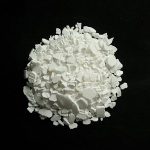Calcium chloride (CaCl 2 ) is a powerful ionic salt compound made up of calcium and chlorine. This remarkable substance is highly soluble in water, yet remains solid at room temperature, making it incredibly versatile.
Calcium Chloride in Spirulina Production
In algae production, CaCl 2 serves as a bioavailable source of calcium, which is essential for the growth of algae. While other methods, such as calcium hydroxide or a calcium reactor can introduce calcium into the system, the addition of calcium chloride is known to be the quickest and least disruptive to pH levels.
CaCl 2 also plays a crucial role in controlling acidity and increasing water hardness. This is particularly useful in concrete ponds, where higher levels of calcium in the water prevent the dissolution of calcium compounds, ensuring the longevity and integrity of the pond structure.
Calcium chloride can be obtained directly from limestone or as a by-product of the Solvay process. However, due to its hygroscopic nature, it’s essential to store it in tightly-sealed containers to maintain its effectiveness.
Is CaCl safe for human consumption?
While generally recognized as safe by the FDA, it’s important to note that the use of CaCl 2 is typically prohibited in organic crop production under the US National Organic Program.
Beyond its industrial applications, calcium chloride finds its way into various other fields. Medicinally, it aids in replenishing calcium levels, acts as an acid-producing diuretic, and serves as an antidote for magnesium poisoning.
In the food industry, CaCl 2 functions as a firming agent for canned vegetables, soybean and tofu products. It also enhances the flavor of pickles, slows down caramel freezing, and corrects mineral deficiencies in beer brewing and cheesemaking. Rest assured, it’s a permitted food additive in both the EU and USA, known as E509.
Hazards to Beware of with CaCl 2
In addition to its multitude of applications, it’s important to be aware of the potential hazards associated with CaCl 2. It can irritate moist skin and cause burns if ingested or in contact with the mouth or throat. Concentrated solutions or solid products may also cause gastrointestinal irritation and high levels of calcium in the blood serum.
From its vital role in algae production to its various uses in food, medicine, and beyond, calcium chloride continues to be a valuable and versatile compound. It may not align with organic certification requirements, but it will produce a fine product that is perfectly safe to use and eat.
Calcium Chloride in Spirulina Production
In algae production, Calcium chloride is used as a bioavailable form of calcium. Calcium hydroxide (kalkwasser mix) or a calcium reactor can also be used to introduce calcium, but calcium chloride addition is the fastest known method and has a minimal impact on the pH.
An important role of CaCl 2 in algae production is controlling the culture’s acidity and increasing the water hardness. In concrete ponds, increasing the concentration of calcium in the water will reduce the dissolution of calcium compounds essential to the structure of concrete, thus prevent leakage and elongate the pond’s lifespan.
CaCl 2 can be produced directly from limestone, but large amounts are also produced as a by-product of the Solvay process. Because of its hygroscopic nature, it must be kept in tightly-sealed containers.
Although CaCl 2 is generally recognized as safe by the FDA, its use in organic crop production is generally prohibited under the US National Organic Program.



